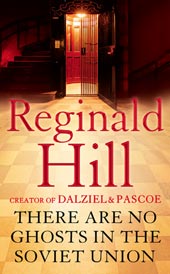
EURO CRIME
Reviews

Hill, Reginald - 'There Are No Ghosts in the Soviet Union'
Paperback: 336 pages (Mar. 2008) Publisher: Harper ISBN: 0007262981
THERE ARE NO GHOSTS IN THE SOVIET UNION is a recently reissued edition of a short-story collection first published in the 80s. It contains six stories in all, one of which features the first trembling steps of Joe Sixsmith onto the printed page, and one of which sort of features Dalziel & Pascoe but definitely doesn't.
And it is the title story that really stands out. It's an excellent piece (at a hundred pages, it's more of a novella, too) set in Stalinist Moscow, in which Inspector Lev Chislenko must figure out why a group of people have just witnessed a murder that happened over 50 years ago. It's excellent: Hill has the space to flesh out Chislenko more than he does some of his other protagonists, and it's definitely he and this story that remains in the mind after the collection is finished. It has everything you could pack into a short story: atmosphere, character, suspense, a bit of romance, a bit of death, a bit of politics, a bit of the supernatural and, as it's Hill, a bit of sly humour. It's worth buying the book for this story alone.
The rest, though, is a slightly mixed bag. Then, short story collections are wont to be, so that's ok. The Sixsmith story, which is the next, is a nice, light piece about the disappearance of a cat that gradually turns into something far more sinister. It's got a very neat twist at the end, and is wholly enjoyable, especially as a first introduction to Hill's recently returned PI. The next story, The Bull Ring, concerning an officer's harsh treatment of a subordinate in the war, didn't really grab me or stand out in any way.
It's the "Dalziel & Pascoe" story, Auteur Theory, that is the real puzzler of the collection. I'll say it now: it's weird. But I'll say this too: it's great. It tells of a fictional account of a film production of Hill's own novel AN ADVANCEMENT OF LEARNING, with actors cast as Pascoe, Dalziel, Ellie, etc. There's a director, a scriptwriter (whose name, like that of Hill's own past pseudonym, is Dick Morland). It's all very meta and postmodern, and while at first it's rather confusing, it definitely works in the end. Hill himself appears as an indignant character ("the bearded author" who skulks around), frustrated with the shift of direction the film takes compared to his book. It's not going to appeal to everyone, as it is by no means a straight mystery, but it's immensely clever, and a lot of the time that is what people appreciate Hill for.
Poor Emma is an Austen-tinged story of that age's social trials culminating in murder. It's subtle, works well, and is told in a style befitting the vague pastiche it is. I enjoyed it a lot, though I saw where it was going. The final story, Crowded Hour is a short sharp sting to the collection, but it ends up as vaguely unsatisfying because I'd rather have had something meatier to bring the collection to a close.
Overall, it's a very good collection, and the title story makes it worthwhile all by itself. It's varied, never fails to be interesting, and is a very welcome re-addition to the Hill canon.
Fiona Walker, England
July 2008
Details of the author's other books with links to reviews can be found on the Books page.
More European crime fiction reviews can be found on the Reviews page.